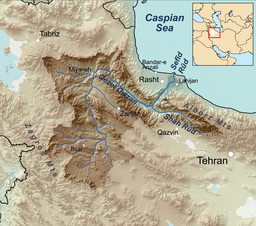Sefīd-Rūd
| Sefid-Rūd (سفيدرود) | |
| Sepid Rud, White River, Sefid River | |
| River | |
| Country | Iran |
|---|---|
| Provinces | Kurdistan, East Azarbaijan, Ardabil, Zanjan, Qazvin, Tehran, Gilan |
| Tributaries | |
| - left | Qizil Owzan |
| - right | Shahrood |
| City | Rasht |
| Source | |
| - location | Alborz Mountains |
| Mouth | Caspian Sea |
| Length | 670 km (416 mi) |
| Basin | 13,450 km2 (5,193 sq mi) |
|
Sefīd-Rūd drainage basin
|
|
The Sefīd-Rūd (Persian: سفیدرود, pronounced: [sefiːdruːd], "White River" Azerbaijani: قزل اؤزؤن) is a river approximately 670 kilometres (416 mi) long, rising in the Alborz mountain range of northwestern Iran and flowing generally northeast to enter the Caspian Sea at Rasht. The river is Iran's second longest river after the Karun.
Other names and transcriptions include Sepīd-Rūd, Sefidrud, Sefidrood, Sepidrood, and Sepidrud. Above Manjil, the river was known as Qizil Uzun, "Long Red River".
The river is historically famous for the quantity of its fish, especially the Caspian trout, Salmo trutta caspius
The Sefid-Rud has cut a water gap through the Alborz mountain range, the Manjil gap, capturing its two headwater tributaries, the Qizil Üzan and Shahrood rivers. It then widens the valley between the Talesh Hills and the main Alborz range. The gap provides a major route between Tehran and Gīlān Province with its Caspian lowlands.
In the wide valley before the Sefid-Rud enters the Caspian Sea a number of transportation and irrigation canals have been cut; the two biggest are the Khomam and the Now.
The Sefid-Rud was dammed in 1962 by the Shahbanu Farah Dam (later renamed Manjil Dam), which created a 1.86 cubic kilometres (0.45 cu mi) reservoir and allowed the irrigation of an additional 2,380 km2 (919 sq mi). The reservoir mediates some flooding and significantly increased rice production in the Sefid Rud Delta. The hydroelectric component of the dam generates 87,000 kilowatts. The completion of the dam had a negative impact on the river's fisheries, through reduced stream flow (due to diversion), increased water temperature, and decreased food availability, especially for sturgeon but also for the Caspian trout.
...
Wikipedia

